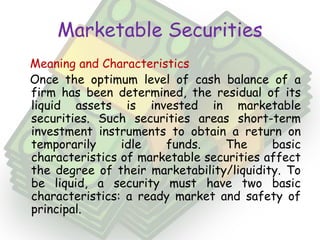Marketable securities are financial instruments that can be easily bought and sold in financial markets. They include a wide range of assets, such as stocks, bonds, and other debt instruments. There are several characteristics that define marketable securities and make them attractive to investors.
One characteristic of marketable securities is liquidity, which refers to the ease with which they can be converted into cash. Because they are widely traded in financial markets, marketable securities are generally more liquid than other assets, such as real estate or collectibles. This means that investors can sell their securities quickly and without significant loss of value, making them a convenient source of funds in case of an emergency or to take advantage of investment opportunities.
Another characteristic of marketable securities is that they offer the potential for capital appreciation. By buying securities, investors can benefit from the growth of the underlying company or issuer. For example, if an investor buys shares of a company whose value increases over time, they can sell the shares at a higher price and realize a profit. Similarly, if the issuer of a bond improves its financial standing, the value of the bond may increase, leading to capital appreciation for the bondholder.
Marketable securities also offer the potential for income, as many of them pay periodic interest or dividends. For example, bondholders receive periodic interest payments, while shareholders of publicly traded companies may receive dividends. This income can provide a steady stream of cash flow for investors, which can be particularly useful for retirees or other individuals who depend on investment income to meet their financial needs.
Finally, marketable securities are subject to various risks, including market risk, credit risk, and inflation risk. Market risk refers to the possibility that the value of the securities will decline due to changes in market conditions, such as economic downturns or shifts in investor sentiment. Credit risk refers to the risk that the issuer of a security will default on its obligations, leading to a loss for the investor. Inflation risk refers to the possibility that the value of the income or returns from the securities will be eroded over time due to rising prices.
In conclusion, marketable securities are financial instruments that offer liquidity, the potential for capital appreciation and income, and are subject to various risks. They can be an important part of a diversified investment portfolio and can help investors achieve their financial goals.






